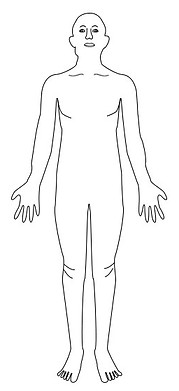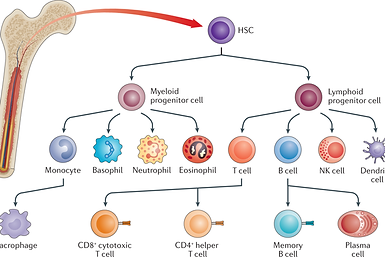top of page
COMPONENTS OF THE IMMUNE SYSTEM
First Line of Defense

Physical barrier
Consists of skin and mucosa to prevent entry of pathogen into body.
Chemical barrier
Consists of stomach, lysozymes (tears) and lactic acid which kill cellular pathogens.
Second Line of Defense
Kills dangerous organisms

Natural Killer Cells
Induce cellular suicide
Upregulate dendritic cell
Eosinophils
Modulate inflammation response
Attacks parasitic worms
Monocytes
Migrate to tissues
Differentiates into macrophages and dendritic cells
Basophils
Migrate to tissues and differentiate into mast cells
Create an environment conducive to defense via chemical release
Macrophage cells
Regulates inflammation
Digest pathogen/cell debris
Mast cells
Create an environment conducive to defense via chemical release
Neutrophils
First responder
Digest pathogen/cell debris that macrophages have failed to clear
Helper T cells
Antigen-specific trigger
Differentiate into killer T cells and memory killer T cells

Memory Natural Killer cells
Long lived
Antigen dependent and independent memory response protects from secondary infection
Killer T cells
Antigen-dependent
Induce cellular suicide

Memory Killer T cells
Long lived
Antigen-dependent response protects from secondary response
Others
Produce antibodies/disable or flag dangerous organisms for destruction
Activates immune cells to kill
B cells
Antigen-specific trigger
Differentiate into memory B cells and plasma cells
Plasma cells
Antibody-producing factory
Memory B cells
Antigen-specific trigger
Differentiate into plasma cells

Antibodies
Bind to antigens or pathogens for opsonisation or cell neutralisation

Dendritic cells
Antigen presenting cells
Process pathogens and present them as antigens on the cell surface to the T cells
Primary Immune System Organs




1. Tonsils
Storage of immune cells for quick response to pathogens
2. Thymus
differentiation/maturation of T cells
3. Appendix
Safehouse for helpful gut bacteria
4. Lymph Node
distribution of immune cells to the blood
5. Spleen
storage of immune cells
6. Bone Marrow
production of immune cells

bottom of page